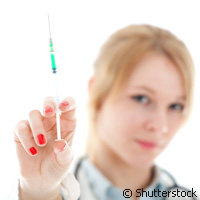EUR 30 million in EU funding for new vaccines
A new EU-funded project set to speed up the development of novel and powerful immunisation technologies for the next generation of human vaccines has just got under way. The ADITEC ('Advanced immunization technologies') project is funded in part by EUR 30 million as part of the 'Health' Theme of the Seventh Framework Programme (FP7); it will bring together scientists from 42 research and industry bodies across 12 different countries. The aim is to establish a strong platform for innovation in a crucial area for human health and to highlight the importance of the vaccine sector in effective health care. The project partners will work on a wide range of vital aspects of vaccination, from basic research and new technologies to clinical trials and public health. The European Commission has got right behind this project as it is directly in line with its innovation targets as part of the EU 2020 strategy, particularly one of its flagship policies, the 'Innovation Union'. Máire Geoghegan-Quinn, Commissioner for Research, Innovation and Science explains: 'New technologies are opening the door to fight those diseases for which vaccines could not be developed so far. However, researchers in a single laboratory cannot tackle modern vaccine science in isolation, which is why we are bringing together some of Europe's top researchers in this area. By joining forces and pooling knowledge and expertise, we can take a big step towards transforming the medicine of the future.' The project will focus on improved potency and safety of vaccines and their components, novel routes and devices for administration of vaccines, optimised vaccination strategies and optimised formulations and vaccination methods for different age groups. It will also enhance our insight into the effects of gender, chronic diseases and genetic variation on vaccination. Finally, ADITEC will apply new technologies and help to establish them widely throughout Europe. The project partners hail from Austria, Denmark, France, Germany, Iceland, Italy, the Netherlands, Norway, Sweden, Switzerland, the United Kingdom, and the United States. The project is one of several run under FP7-HEALTH as high impact initiatives for better immunisation. The search for new therapies and better immunisation strategies encompasses gene and cell therapy, immunotherapy, tissue engineering and regenerative medicine; these offer hope to find treatments for diseases which are currently untreatable, where life is at stake, and for regenerating diseased, damaged or defective tissues and organs. The main difference between these new types of vaccine strategies and traditional means of searching for therapies is that they employ large biomolecules, genes, cells and tissues rather than drugs or pharmaceuticals. It is hoped that the ADITEC project will help address conditions like arthritis, diabetes, and heart and neurodegenerative diseases, all problems that are only set to get worse as Europe's population ages.For more information, please visit:FP7-HEALTH research:http://cordis.europa.eu/fp7/health/
Countries
Austria, Switzerland, Germany, Denmark, France, Iceland, Italy, Netherlands, Norway, Sweden, United Kingdom, United States



